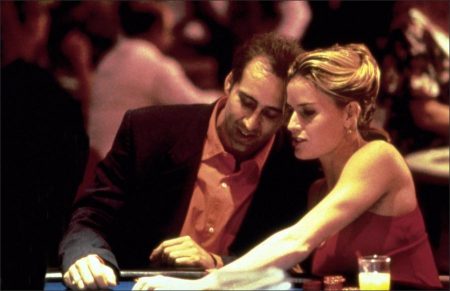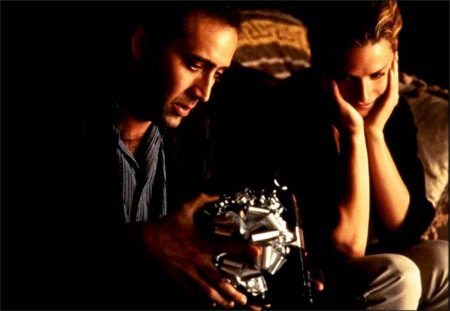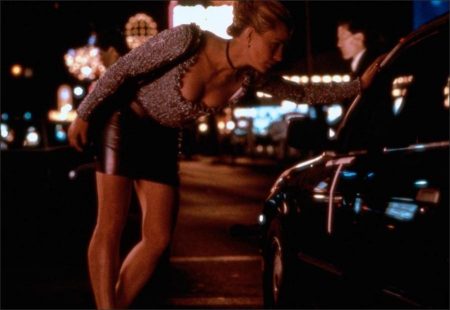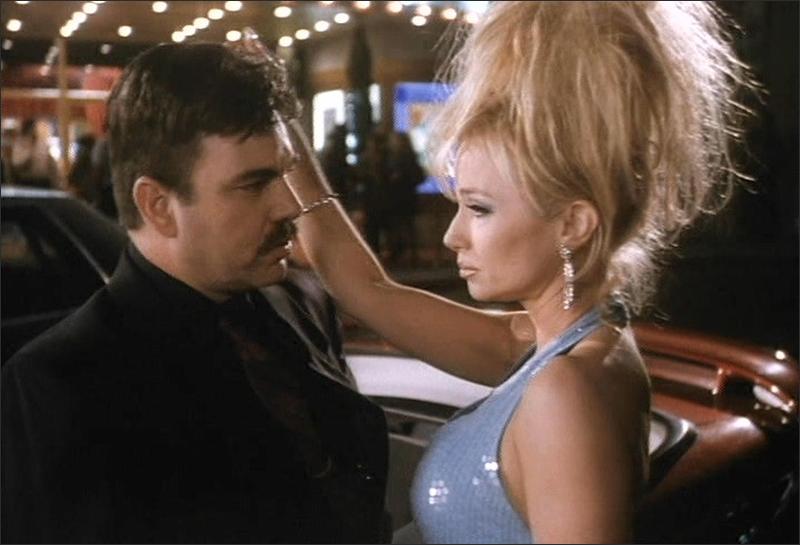Leaving Las Vegas Movie Trailer. Oh, this movie is so sad! It is sad not because of the tragic lives of its characters, but because of their goodness and their charity. What moves me the most in movies is not when something bad happens, but when characters act unselfishly. In “Leaving Las Vegas,” a man loses his family and begins to drink himself to death. He goes to Vegas, and there on the street he meets a prostitute, who takes him in and cares for him, and he calls her his angel. But he doesn’t stop drinking.
The man’s name is Ben (Nicholas Cage). The woman’s name is Sera (Elisabeth Shue). You will not see two better performances this year. Midway in the film someone offers Ben the insight that his drinking is a way of killing himself. He smiles lopsidedly and offers a correction: “Killing myself is a way of drinking.” At one point, after it is clear that Sera really cares for him, he tells her, “You can never, ever, ask me to stop drinking.” She replies in a little voice: “I know.”
The movie is not really about alcoholism. It is about great sad passion, of the sort celebrated in operas like “La Boheme.” It takes place in bars and dreary rented rooms and the kind of Vegas poverty that includes a parking space and the use of the pool. The practical details are not quite realistic – it would be hard to drink as much as Ben drinks and remain conscious, and it is unlikely an intelligent prostitute would allow him into her life. We brush those objections aside, because they have nothing to do with the real subject of this movie, which is that we must pity one another, and be gentle.
Ben was a movie executive. Something bad happened in his life, and his wife and son are gone. Is he divorced? Are they dead? It is never made clear. “I’m not sure if I lost my family because of my drinking, or if I’m drinking because I lost my family,” he muses. The details would not help, because this is not a case history but a sad love song. Cage, a resourceful and daring actor, has never been better.
Consider an opening scene where Ben attempts to make jokey small talk with some former colleagues who have long since written him off as a lost cause. He desperately needs money because he needs a drink – now, right now! He is shaking. He may go into convulsions. Yet he manufactures desperately inane chatter, dropping famous names. Finally one of the former friends takes him aside, gives him some money and says, “I think it would be best if you didn’t contact me again.” Minutes later, brought back to life by alcohol, he is trying to pick up a woman at a bar: “You smell good,” he says.
She catches a whiff of his breath: “You’ve been drinking all day.” What could possibly attract Sera, the prostitute, to this wounded man? We learn a little about her, in closeups where she talks about her life to an invisible therapist. She is proud of the way she controls her clients and sets the scenarios. She is adamant that none of them is ever really allowed to know her. She has an abusive relationship with a pimp (Julian Sands), and we can guess that she probably also had an abusive father; it usually works out that way.
The pimp is soon out of the picture, and “Leaving Las Vegas” becomes simply the story of two people. Perhaps she likes Ben because he is so desperate and honest. She takes him in as she might take in a wet puppy.
It is unclear to what extent he fully understands his circumstances. At times he hallucinates. He calls her his “angel” fancifully, but there are moments when she literally seems to be an angel. He hears voices behind the walls. He shakes uncontrollably. He asks her, “How did our evening go?” There is a curious, effective scene in which he tries to get a check cashed, and his hands shake too much to sign his name. He goes off to drink himself into steadiness, and then it seems he returns and makes obscene suggestions to the teller, but they all take place in his head.
Mike Figgis, who wrote, directed, and composed the music for this movie, is a filmmaker attracted to the far shores of behavior. Here he began with a novel by a man named John O’Brien, whose autobiographical sources can be guessed by the information that he killed himself two weeks after selling the book rights. To be sure this project wasn’t compromised, Figgis shot it as an independent film, using Super 16 cameras to “grab” Las Vegas locations. The outdoor scenes feel unrehearsed and real.
The movie works as a love story, but really romance is not the point here, any more than sex is. The story is about two wounded, desperate, marginal people, and how they create for each other a measure of grace. One scene after another finds the right note. If there are two unplayable roles in the stock repertory, they are the drunk and the whore with a heart of gold. Cage and Shue make these cliches into unforgettable people. Cage’s drunkenness is inspired in part by a performance he studied, Albert Finney’s alcoholic consul in “Under the Volcano.” You sense an observant intelligence peering from inside the drunken man, seeing everything, clearly and sadly.
Shue’s prostitute is however the crucial role, because Sera is the one with a choice. She sees Ben clearly, and decides to stick with him for the rest of the ride. When he lets her down badly, toward the end of the movie, she goes out and does something that no hooker should do – gets herself into a motel room with a crowd of drunken college boys – and we see how she needed Ben because she desperately needed to do something good for somebody. He was her redemption, and when it seems he scorns her gift, she punishes herself.
“Leaving Las Vegas” is one of the best films of the year, deserving many Academy Award nominations. That such a film gets made is a miracle: One can see how this material could have been softened and compromised, and that would have been wrong. It is a pure, grand gesture. That he is an alcoholic and she works the streets are simply the turnings they have taken. Beneath their occupations are their souls. And because Ben essentially has given up on his, the film becomes Sera’s story, about how even in the face of certain defeat we can, at least, insist on loving, and trying.
Leaving Las Vegas (1996)
Directed by: Mike Figgis
Starring: Nicolas Cage, Elisabeth Shue, Julian Sands, Richard Lewis, Steven Weber, Emily Procter, Valeria Golino, Carey Lowell, Albert Henderson, Anne Lange
Screenplay by: Mike Figgis
Production Design by: Waldemar Kalinowski
Cinematography by: Declan Quinn
Film Editing by: John Smith
Costume Design by: Laura Goldsmith
Set Decoration by: Florence Fellman
Art Direction by: Barry Kingston
Music by: Mike Figgis
MPAA Rating: R for strong sexuality and language, violence and pervasive alcohol abuse.
Distributed by: Metro Goldwyn Mayer
Release Date: February 9, 1996
Views: 258







